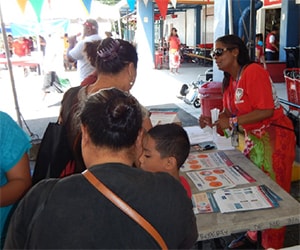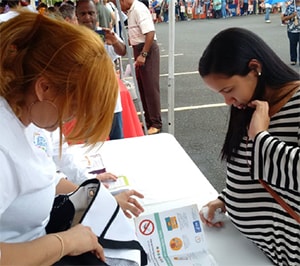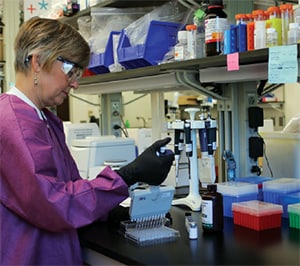Zika Stories: From the Field

Corporations Partner with Local Health Departments to Help Fight Zika
CDC has linked corporate partners with local health departments to help fight Zika in areas most affected by the virus. Through this strategy, corporate partners like Home Depot, Ace Hardware, and Walgreens co-sponsored community events known as Zika Action Days with local health departments; corporate partners have helped get Zika prevention information and products along with Zika Prevention Kits for pregnant women to community members who attended events in Puerto Rico, the US Virgin Islands, American Samoa, and Florida.
Home Depot sponsored the first Zika Action Day in Caguas, Puerto Rico. About 800 attendees, including 100 children who participated in a children’s workshop, learned different ways to prevent mosquito bites. “Partnering with retail stores benefits community members, as they can interact with the people they see all the time at their local Home Depot or Walmart,” said Mahmoud Aboukheir, who served as a health educator with the Puerto Rico Department of Health.

Similarly, during a Zika Action Day in American Samoa sponsored by Ace Hardware, participants received flu shots and health screenings in addition to Zika prevention education and resources. Walgreens has also helped support Zika prevention efforts by sponsoring a Zika Action Day in St. Thomas in the U.S. Virgin Islands. The corporation has set up in-store displays of CDC educational materials alongside EPA-registered insect repellents and other Zika prevention products. Walgreens has featured these displays in communities at high risk for Zika across the United States, including 152 stores within Puerto Rico. Several other pharmacies have also used this model, extending CDC’s reach and amplifying Zika prevention messages.
For all of the Zika Action Days, the CDC Foundation has played a critical role. The Foundation helped CDC identify corporate sponsors as well as fund the purchase of Zika Prevention Kits for pregnant women. CDC Zika responder Sue Visser helped coordinate the first Zika Action Day in Puerto Rico and has continued to work with corporate partners on Zika prevention activities. “Corporate partners want to help. They see what’s happening in their community and want to position themselves as a trusted resource for Zika prevention,” said Visser.
Integrating Data to Improve Zika Reporting in Massachusetts
In Massachusetts, the first state to report Zika data to CDC’s US Zika Pregnancy Registry, 40% of all calls placed to the Department of Public Health’s Infectious Disease Epidemiology Program in 2016 concerned Zika. Massachusetts has an active birth defects surveillance system, but when the Zika outbreak began, the system couldn’t quickly identify cases of birth defects in babies.
Connecting Zika Surveillance across Disciplines
The state’s Birth Defects Team and Infectious Disease Team initially collected Zika case information through two separate secure systems — one for vector borne diseases and one for birth defects. However, as knowledge emerged of the risk of Zika-related birth defects in babies born to women infected during pregnancy, both groups needed to share information and have access to all relevant data, securely, in one place. Efforts to integrate the two systems b egan in spring 2016, and the new system went live in May 2017.
The teams worked with health facilities to get remote access to electronic records of babies born to mothers infected with Zika during pregnancy. Having secure remote access reduced the amount of time staff spent traveling to and from hospitals to review records.
Collecting Data on Zika-related Birth Defects
In addition to accelerating the collection process for Zika and birth defects cases from health facilities, Massachusetts also prioritized the reporting of data on Zika-related birth defects from the birth defects monitoring program. The sooner data are collected from the monitoring program and made available for analysis, the sooner public health officials can understand the risks of Zika infection and take action. Data turnaround times in the state are far ahead of national standards, which normally give states two years to report the final data.
Building Laboratory Capacity to Test for Zika

Infectious disease surveillance relies on laboratory testing. Most public health laboratories can do the initial testing for Zika, but Massachusetts is one of only five states that can also do a more advanced test that distinguishes Zika from similar viruses when initial test results are unclear. Using this test to confirm Zika virus infection in pregnant women can help ensure appropriate infant follow-up care. The Massachusetts State Public Health Laboratory rapidly established its Zika laboratory testing capacity with funds from CDC’s Epidemiology and Laboratory Capacity for Infectious Diseases Cooperative Agreement.
Catherine Brown, DVM, MSc, MPH, Deputy State Epidemiologist and State Public Health Veterinarian for the Massachusetts Department of Public Health, describes the effect of CDC funding: “We had a strong foundation, but getting additional resources from CDC allowed us to leverage and improve our capacity to respond to Zika and collaborate with each other in a very integrated way.”